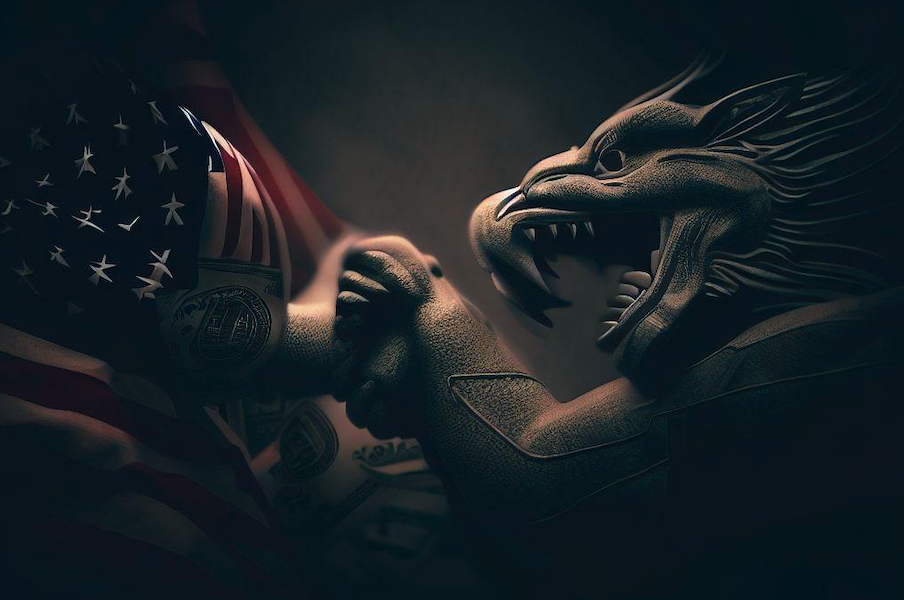This week, there has been an explosion in debates around the future of the US Dollar.
What has been the cause of this?
Firstly, let’s remember that the might of the United States is based on countries settling trade, but more importantly, energy, in US Dollars. Nothing is more important to the US.
Well, those pesky countries called China, Russia and others (South Africa included) aren’t listening to big uncle Sam.
Recently, Russia has embraced the Chinese renminbi for trade.
India and China are planning to trade in their own currencies, to bypass the ‘US dollar dominance’.
China and France have just settled the first LNG trade in Yuan.
And only a few hours ago, there was news that BRICS will be developing a new currency.
And the cherry on top… Saudi Arabai has recently joined a trade alliance with China, Russia, India, Pakistan and other Asian nations. They are considering using the Chinese Yuan for settlement, over the US Dollar.
This is not good for the US Dollar. Not good at all.
So of course, the alarmists are ringing the Bells of Doom with clamor and glee.
Yet, at the foundations, it would take an enormous effort to remove the Dollar as the world reserve currency.
Let’s look at both sides…
Part 1: The argument for the collapse of the US dollar
The petrodollar system, established in the 1970s, has been the dominant global currency for oil trade, with the US dollar accounting for approximately 90% of all oil trade transactions.
However, recent events have led to renewed speculation about the future of the petrodollar system. One of the reasons why the US dollar may collapse is due to the declining influence of the US military in the Middle East, which has been a key factor in securing oil from the region. With the US military presence in the region declining, it may become more difficult for the US to maintain the petrodollar system.
Moreover, countries such as Russia and China have been actively seeking to reduce their reliance on the US dollar and diversify their reserves away from the currency. China has been pushing for the yuan to be used for oil trade, with the idea of the petroyuan replacing the petrodollar as a potential threat to US hegemony in the Middle East. Additionally, China and Brazil recently struck a deal to ditch the US dollar in their trade transactions, which could potentially undermine the US dollar’s status as the world’s reserve currency.
Furthermore, the petrodollar system has allowed the US to print money at will and run up huge debts without suffering the consequences of inflation or currency devaluation. This is simply Japanification v2.0 – just look at the value of the Yen today.
The US dollar’s status as the world’s reserve currency has given the US enormous political power over countries that rely on its currency for trade. However, this system cannot last forever, and the US dollar’s collapse could have significant implications for the global economy.
Part 2: The argument against the collapse of the US dollar
Despite the challenges posed by the decline in US military presence in the Middle East and the increasing use of alternative currencies in trade transactions, there are still reasons to believe that the US dollar will not collapse.
The US is still the most powerful country in the world from a military and economic standpoint.
The US is also the largest oil-producing country, which gives it significant leverage in maintaining the petrodollar system. Additionally, the US dollar is freely convertible and extremely liquid, making it the preferred currency for international trade and investment.
Furthermore, most Middle Eastern currencies are pegged to the US dollar, requiring a constant inflow of US dollars to support the system. This means that Middle East countries have a vested interest in keeping the dollar at the top of the currency hierarchy, and there is little appetite among OPEC producers to price oil in yuan using a Chinese exchange.
While the US dollar faces significant challenges to its status as the world’s reserve currency, there are still reasons to believe that it will not collapse. The US remains the most powerful country in the world, with significant leverage in maintaining the petrodollar system.
Furthermore, the US dollar’s liquidity and status as the preferred currency for international trade and investment make it difficult to replace. Nonetheless, the global economy is always subject to change, and the future of the US dollar remains uncertain.
In summary, both sides have solid arguments. Yet, it is frightfully short-term-thinking. Wouldn’t you say?
If you’re on the Austrian side of economics or into the fundamentals of Bitcoin – you will probably think that there is not a good ending to the current system.
According to Alfonso Peccatiello, a renowned Macro analyst recently said the central banks’ policies, including low interest rates and quantitative easing, have only created more problems, such as asset bubbles and wealth inequality.
He believes that the current economic system is fundamentally flawed and that there is no solution to the predicament they have created.
Peccatiello highlights the irony of central banks’ attempts to stimulate economic growth through policies that have only delayed the inevitable economic collapse. He contends that the current economic system is based on perpetual growth, which is unsustainable in a world of finite resources. Peccatiello believes that central banks’ actions are hypocritical, as they claim to be helping the economy, while actually exacerbating the problems.
And he believes with the ‘impending collapse’, the US dollar will also go up in value as people flee to the safety of the dollar – as they always have in modern history.
Once again, all of this is just short-term thinking.
No matter what side you look at, the question to ask is what could possibly keep any fiat currency from debasing against scarce goods?
That is the real question to ask and to always try to find the answer to.
Please let us know if you do find the answer.
In the meantime, we’ll just sit this one out, think long-term, not play these Keynsian games – because in the end, whether it’s the Dollar, the Yuan, the Rand, it just doesn’t matter.
They’re all doomed anyway.
#BuyBitcoin
#NotYourKeysNotYourCoins



